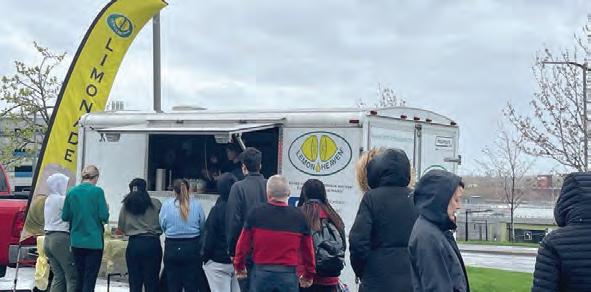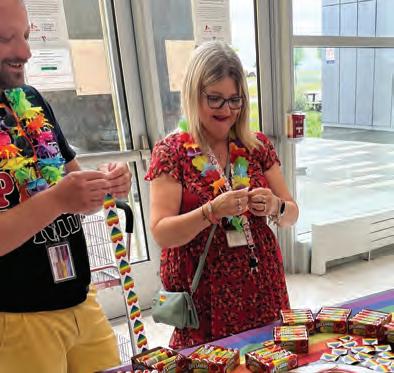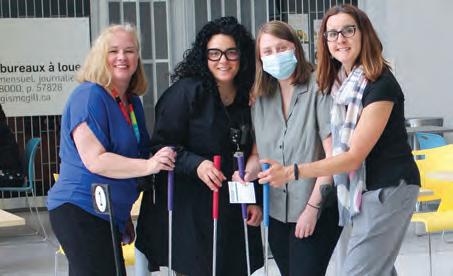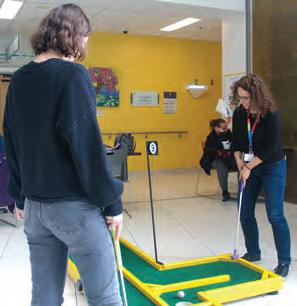Chez nous
Improving patient care, one simulation at a time

— page 4
ALSO IN THIS ISSUE:
Building a culture of safety — page 8
A single access point for referring physicians — page 11
The summer is magic at the MCH — page 13

Improving patient care, one simulation at a time

— page 4
ALSO IN THIS ISSUE:
Building a culture of safety — page 8
A single access point for referring physicians — page 11
The summer is magic at the MCH — page 13
We are pleased to announce that the Montreal Children’s Hospital (MCH) town hall events for the entire Children’s community, that moved online and had only one focus as we navigated the pandemic emergency, have now returned as a permanent feature. We want to bring everyone together and share updates on what we are accomplishing, the challenges we are facing and our outlook for the future.
We purposefully reserve significant time for questions and answers, so please join us live if you can. If not, you will find the links to video recordings of these events within the “Montreal Children’s Hospital Community” section of the MUHC intranet.
On June 1, the last town hall introduced a number of exciting developments, from starting our new Access Care Coordination Centre and Pediatric Ground Transport Team
for critically ill children, through attracting, retaining and continuously training our excellent teammates, to enhancing still further our culture of safety, with a good half dozen or so other important topics.
If you missed that town hall, you missed quite a lot, so please check out the video! The next town hall will be on September 15 and we hope you will join us.
Many of us long for the “sense of MCH community” from when we mingled with one another more easily back at the legacy site, even as there are more and more of us who never worked on Tupper Street. Note that several wonderful activities are presently organized at the MCH, including Grand Rounds, Quality of Life at Work Committee activities and other special events. Information is usually available through the MUHC intranet.
So please do not be shy to join in on one or more events outside your service when you see one that interests you! But first, do not hesitate to share your own events information by writing to Cynthia Esposito: cynthia.esposito@muhc.mcgill.ca
About our excellent teammates: our first Open House in the spring to inform and attract future personnel was a huge success. We will be using lessons and
feedback to have a bigger and better Open House on September 28. In addition to our own publicity at educational institutions, please share the word personally and enthusiastically with young people within your family and among friends so they may consider joining us all for a rewarding career.
Excellence attracts excellence, so thank you all for your amazing care for sick children and their families!
Montreal Children’s Hospital and Women’s Health Mission of the MUHC
Associate director of Multidisciplinary Services and Support Programs
Associate director of Professional Services
Editor: Christine Bouthillier
Contributors: Roxane Gaudreault, Maureen McCarthy
Design : Vincenzo Comm Design inc.
Photography: Roxane Gaudreault, Spencer Halickman, Melanie Nixon
Montreal Children’s Hospital and Women’s Health Mission of the MUHC
by the MCH Public Relations and Communications office.
To submit story ideas or texts to Chez nous, contact the Public Relations and Communications office at ext. 24307 or send an email to mchpr@muhc.mcgill.ca.
Production of Chez nous is made possible thanks to funding from the Montreal Children’s Hospital Foundation.
On the cover: The Centre for Pediatric Simulation team: Dr. Ilana Bank, Maia Siedlikowski and Kelly Cummins.
Cover photo: Spencer Halickman
Montreal Children’s Hospital Follow
This past May, the Montreal Children’s Hospital (MCH) proceeded to the official opening of its Centre for Pediatric Simulation, one of only a few world-class simulation centres with on-site pediatric education facilities.
u Above: Attendees at the inauguration of the Centre for Pediatric Simulation had the opportunity to see the team in action during a simulation.

The mission of the Centre for Pediatric Simulation is to provide interprofessional training created to mirror real-life situations — from the rarest to the most common scenarios — to help MCH teams provide the best patient care.
The goal of the centre is to advance clinical care, disseminate knowledge, increase patient, family and staff safety, strengthen the culture of simulation as a training method and generate research topics.
The MCH has been conducting simulations for many years to enhance the knowledge of its professionals. However, to meet the growing demand, a dedicated full-time team is now established and is housed in the MCH’s National Bank Family Resource Centre.
“Continuing education is the cornerstone of ongoing improvement in patient care. Thanks to significant advances in the
medical field, healthcare is becoming more complex, creating a pressing need for new and innovative learning methods for professionals, of which simulation is an integral part,” says Dr. Ilana Bank, medical director of the Centre for Pediatric Simulation.
“The entire team is very proud to have opened a cutting-edge centre that addresses the need for training.”

Simulations foster the development of new skills, teamwork, problem-solving, decision-making and patient/familycentered care, while improving clinical outcomes.

Practice makes perfect, and simulation allows health professionals to put knowledge into action in a risk-free environment. By being exposed to a variety of medical situations, healthcare professionals are better prepared and more confident when caring for a sick child. They also learn best practices for communicating with patients and their

families and for providing them with reassurance and comfort.
Services offered at the Centre for Pediatric Simulation include:
• a mobile unit to facilitate pediatricbased educational sessions in the hospital’s patient care areas;
• mannequins of varying sizes and ages to reflect the pediatric population;
• a dedicated multidisciplinary team committed to designing and facilitating educational sessions based on each team’s specific learning needs.
Many events can be simulated, including but not limited to trauma, surgical care, medical care, resuscitation drills, various codes (for example, respiratory arrest) and disaster preparedness. If you can think of it, the Centre’s team can simulate it!

The sessions can be filmed or livestreamed so they can be viewed remotely in real time or afterwards. Following each simulation, a debrief is organized to help identify challenges and opportunities for improvement.
Sincere thanks to the Montreal Children’s Hospital Foundation and its donors, including the Thistledown Foundation, the Lassner family and CAE, who made this project possible. i
Dr. Samara Zavalkoff is a physician in the Pediatric Intensive Care Unit (PICU) at the Montreal Children’s Hospital (MCH). But beyond the PICU, she holds another important role at the hospital. She has long been interested in patient safety and her current role as medical director of Patient Safety comes after several years of helping to build a culture of safety at the hospital.
continued >
u Above: As part of the Canadian Patient Safety Week, Mission: Safety organized the “Crib of Horrors”, an interactive course where participants had to identify errors or bad practices in patient safety.

In 2017, against a backdrop of growing awareness of safety issues in the healthcare setting, Dr. Zavalkoff, along with Drs. Nadine Korah and Sasha Dubrovksy, led the “We should talk” initiative at the MCH, which focused on communication, and more specifically, miscommunication as a source of safety issues. Fast forward to 2023 and the MCH has made great strides in formalizing its approach to safety by making it a top priority.

Dr. Zavalkoff works with Alexandra Black, safety co-lead and senior advisor, Bureau de la qualité et de l’amélioration continue. Jordana Saada, senior advisor, Partnership and Patient Support Programs, is currently involved as interim senior advisor in Continuous Improvement at the MCH. They work closely with the quality and risk department, the DQEPE, which is mandated by the government for hospital safety.
Dr. Zavalkoff explains that safety issues are wide ranging and can affect everyone, whether patients or staff. “Everything ultimately comes down to safety,” she says. “When a patient has to wait a long time, when we don’t have the right equipment, when we’re understaffed, if we don’t share enough information with a family — these all have safety implications.”
The Mission: Safety program was developed to create awareness of and improve safety in the hospital, and it’s something that Dr. Zavalkoff emphasizes is here to stay. “This is not a shortterm project, it’s permanent. It’s who we are now.”
In the past year, the program has put in place a safety committee which is multidisciplinary in nature and represents many areas of the hospital. All committee members have some form of patient safety expertise and they liaise with people from areas such as IT, Building Services and Security on safety projects.
“We’re trying to do many things, but at this stage, what’s most important is building a culture of safety, which means that people understand and believe that we work in a “no shame, no blame” environment,” says Dr. Zavalkoff. Everyone
is therefore encouraged to report safety issues without fear of judgement, she explains.
The team’s concrete efforts to make the hospital safer involve looking both backward and forward. With the former, the safety committee aims to understand how a safety event happened and how to prevent it from happening again.
From a retrospective viewpoint, they ask a lot of ‘whys’ to analyze a safety event. This summer, the committee started an important project which continued >
involves working on an electronic system for collecting all safety events to categorize and address them.
They are also creating a high-level, safety event review committee to confirm the issue or cause of an event and recommend a solution. They have also set up safety dyads in the inpatient clinical areas, which all have a physician safety lead and nurse/allied health professional safety lead.
“So when we have an event and need to work with people on the ground, we know who the safety leadership is,” says Dr. Zavalkoff. In the coming year, they plan to establish dyads for outpatient services too.
While understanding how and why safety events happen is essential, staying ahead of the problems also factors into the equation.
“Everyone wants to do their very best but sometimes our system isn’t structured for it,” explains Dr. Zavalkoff, “so looking at where things can improve, how we can make things better is part of our proactive approach.”
In 2022-2023, Mission: S afety ran a lunch & learn series, open to anyone at the MCH, to learn about various topics such as medication safety and communication safety. And in 2024, Dr. Zavalkoff says they plan to join an
international collaborative organization of pediatric hospitals called Solutions for Patient Safety with the goal of sharing knowledge and supporting each other in making pediatric hospitals safer everywhere.

Dr. Zavalkoff acknowledges that there’s a lot of work to be done but it’s the direction the hospital has to move in. “We do great things for our patients, and we just have to keep doing them as safely as possible and looking for ways to make them safer.”
Part of that also has to do with families. Currently, when a safety event happens with a patient, the family is asked to take part in a review. “Family members can give critical perspectives about what happened and their input is very important,” says Dr. Zavalkoff. “One of our goals is to add a family member to the safety committee in the near future.”
Dr. Zavalkoff thinks that building a culture of safety extends to every corner of the hospital, no matter which area or department a person works in. She and the committee members want to cultivate an environment where everyone thinks about safety in everything they do.
“It’s not just about a few select people from a handful of departments,” she says. “It’s something that belongs to everybody at the MCH.” i
Communication between community hospitals and tertiary care centres is crucial to patient care. To facilitate and speed up exchanges between referring physicians and staff at the Montreal Children’s Hospital (MCH), a direct line was set up in early May 2023 via the new Access Care Coordination Centre.

• Medical or surgical subspecialties
• Psychiatry
• General pediatric consultations
“The initiative came from a desire to improve our services. The launch of the pediatric ground transport team, a shared initiative with CHU Sainte-Justine, gave us an opportunity to launch the Access Care Coordination Centre. Thanks to
this project, we can avoid unnecessary communication and transfers to the wrong specialists,” explains Dr. Anab Lehr, the project’s medical lead and a pediatric intensivist at the MCH.
“The process required the collaboration of several parties, including the heads of various departments. They helped to set up clear and effective algorithms that now guide the actions of the staff who take the calls.”

To respond to requests and ensure efficient transmission of information, a team of access care coordinators was created and trained, and is now fully operational, 24 hours a day, seven days a week.


Access care coordinators are licensed practical nurses (LPN). In their role as intermediaries, they are able to efficiently handle most of the requests they receive. They are responsible for transmitting medical consultations to doctors by telephone, coordinating requests for transfers or transportation by gathering needed information and putting the professionals concerned in touch with each other.
They also handle calls for the Emergency Department, Trauma, Pediatric Intensive Care Unit and Day Hospital. Finally, the access care coordinators are also responsible for gathering data on the volume and nature of calls received by the hospital, helping to optimize the deployment of resources in the field and assess the need to expand the project.
“As a nurse, I love helping people in need. With the development of the new service, I’m in a position to make a difference. I like knowing that Quebec doctors can count on us. We are constantly contributing to improving patient health,” says Suki Wai-Yen Li, access care coordinator.



Since the launch of the Access Care Coordination Centre in May, over 400 requests have been processed and the number of weekly requests is growing steadily. The rise in popularity of the service can be explained by sustained communication efforts, but also by word of mouth from MCH physicians to their colleagues in the community.
The service is expected to grow from strength to strength. Access care coordinators will be given more responsibilities in the next phases of the project, including managing calls for surgery, psychiatry and medical and surgical subspecialties, which are currently still redirected to locating.

“The access care coordinators’ services are evolving and are set to expand over the next 18 months. Currently, we have one LPN per shift who answers the phone. In the next phases of the project, we plan to widen their role in coordinating patient care, which will lighten the workload of other MCH staff, who will be able to spend more time working with patients,” concludes Jeniene Birks, project manager in the Bureau de la qualité et de l’amélioration continue at the MCH. i
As requested by the Ministère de la Santé et des Services sociaux, all MCH physicians must ensure that their med@ssss email address is activated in order to receive patient information from the access care coordinator.
















 By Roxane Gaudreault
By Roxane Gaudreault



The Quality of Life at Work Committee at the Montreal Children’s Hospital (MCH) made sure to bring a little sunshine this summer into the lives of its employees! Did you miss any of the events? Here’s a roundup of what took place! Thanks to the Montreal Children’s Hospital Foundation, which funds the committee.



On May 3, the committee treated MCH staff to ice-cold Lemon Heaven lemonade! Many braved the less-than-perfect weather to line up at the food truck set up outside the hospital.










On June 28, everyone had the chance to proudly display their colours in support of an inclusive and welcoming environment. Rainbow stickers and candy were given out at the hospital entrances.



On June 13, the P.K. Subban Atrium turned green to allow the entire MCH community to practice their putting skills during coffee break at a very special mini-golf course set up for the occasion!